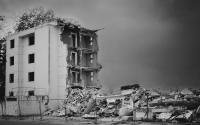1 January 2005Gush Shalom
Let's imagine for a moment that the huge tidal waves had hit the western shores of Europe, that more than a hundred thousand English, Irish, Dutch, Belgian, French, Spanish and Portuguese had fallen victim to the tsunami, and that the east coast of the United States had also suffered.
How the world would have sprung into action! How the governments would have been galvanized! What huge sums of money would have materialized within hours to save what could be saved and prevent the epidemics that threatened millions!
But it did not happen in Europe. It happened to remote, poverty-stricken Asiatic countries. And that makes all the difference.
Was this bound to happen?
The earthquake could not have been prevented and sufficient warning of it could not have been given. But the moment an earthquake under the sea was registered, the tsunami was to be expected. When it started its amok race across the ocean, there was enough time to warn more distant shores. After all, a few minutes were enough for tens of thousands to run to higher ground or climb to higher floors. Such a warning was not given.
Mankind has reached the moon. Spaceships explore far-away stars. Billions upon billions have been invested in these efforts. But the human genius is not sufficient to save hundreds of thousands of human beings from such a natural disaster.
It can always be argued that this is wisdom after the fact. But where are the experts whose job is precisely to warn of dangers before they arrive? The media are full of stories about experts who slept on their watch, about monitoring-centers that received a warning in time and did not transmit it to where it was needed, about scientific institutes that were shut down for the weekend and therefore could give no warning, about the lack of a minimal emergency communications system for such contingencies.
We are told that on the shores of the Pacific the situation is better as far as this specific danger is concerned, After all, "tsunami" is a Japanese word (a combination of "harbor" and "wave"). Are the shore-dwellers of other seas less privileged?
The reaction of the Western world was scandalous.
The British Prime Minister, Tony Blair, continued to enjoy his holiday in Egypt. Kofi Annan broke his holiday only on the fourth day of the disaster, and then just to deliver one of his oily speeches. The President of the United States stayed on his Texan ranch and made a routine statement, and then used most of it to denounce the United Nations "relief coordinator", Jan Egeland, for attacking the "stinginess" of the Western governments. The hapless bureaucrat apologized at once. Colin Powell, by now a pathetic caricature of himself, rejected the accusation that the United States had not done its duty when it donated 15 million dollars (!) for aid.
And indeed, the practical responses were ludicrous. Within a few hours it was already evident that many billions were needed to save, prevent disease and rebuild. Washington donated one million, then 15 million, then increased that to all of 35 million – less than the bill for President Bush's second inauguration party. (Later, under pressure, this was increased tenfold.) The United Kingdom offered a similar sum. Other countries donated various amounts. Even the Israeli government donated some money, with such a fanfare you'd think it was saving the world.
All this together was not even a drop in the ocean – perhaps an unfortunate metaphor these days.
One can try to excuse this with the shock that overcame the world during the first few days. It took time for the political system in the countries of the world to grasp the full extent of the catastrophe. Television, a medium that is especially suited to such situations, brought the pictures into every home, activating public opinion and exerting pressure on the politicians. But even this was not enough to ensure a suitable response. Especially as the media concentrated in a few accessible areas, but did not reach the hundreds of other affected places in remoter regions. This created a completely false image of the extent of the assistance; tear-jerking stories were broadcast instead of reports on the real situation.
It can be argued that there is no way to foresee a catastrophe of such huge dimensions and be prepared for its coming. That may be true. But the world was not even ready for a disaster on a much smaller scale.
Some years ago, after the big earthquake near Istanbul, the International Herald Tribune published an article of mine, appealing for a mental revolution in this field. I proposed the creation of an International Rescue Force.
I called for the setting up of a standing force, with a General Staff and a chain of command, that would be able to respond to a major disaster within hours and to mobilize within a matter of days all that is necessary for dealing with a large international catastrophe.
What is needed for this purpose is a permanent staff in perpetual readiness, 24 hours a day, every day of the year. This staff must have at its command rescue forces in many countries that can spring into action on very short notice. It must be able to provide the logistic infrastructure for rushing in aid by air, land and sea, even when the disaster destroys airports, roads and harbors. It must be able to call on trained teams of experts for rescue work and logistics, as well as medical staff. It must have access to dedicated resources that are available at short notice. If all this is ready in advance, massive rescue and aid operations could be set in motion within hours and scaled up in the following days as necessary.
Such a body could also coordinate a world-wide warning system for natural disasters of various forms, using all available means, including satellites, and ensure that the warnings reach the threatened population in time.
The International Force would not replace the voluntary aid organizations that are doing a wonderful job. It must function as the command and mobilization center, ready to act immediately.
Such a force could contribute something to the unity of mankind. A large-scale disaster unifies nations and moderates conflicts, as can be seen this week. I believe that the creation of an International Rescue Force can constitute a step in the direction of world-wide cooperation.
My proposal aroused some positive reaction but ran immediately into the reflexive opposition of the international bureaucracy. At the United Nations, somebody declared in an injured tone that there was already a group of officials in charge of this matter etc. etc. Nothing, of course, was done. This week we saw the consequences – days passed before the first significant aid operations started rolling, and they were on a pitifully inadequate scale compared with the disaster itself. But on TV, well-groomed bureaucrats in suits and ties explained that everything was being done according to established procedure.
The International Rescue Force must be set up in order to be ready for the next catastrophe. To command it, an authoritative personality should be appointed, a person with imagination, mental agility, organizational talent and a penchant for improvisation. We have such people in Israel, too. I am sure they are to found in other countries. What is lacking is the international will.
As before, mankind can be satisfied once again with clicking the tongue and with actions whose sole purpose is to do the very minimum – and forget the whole business within a few days.






